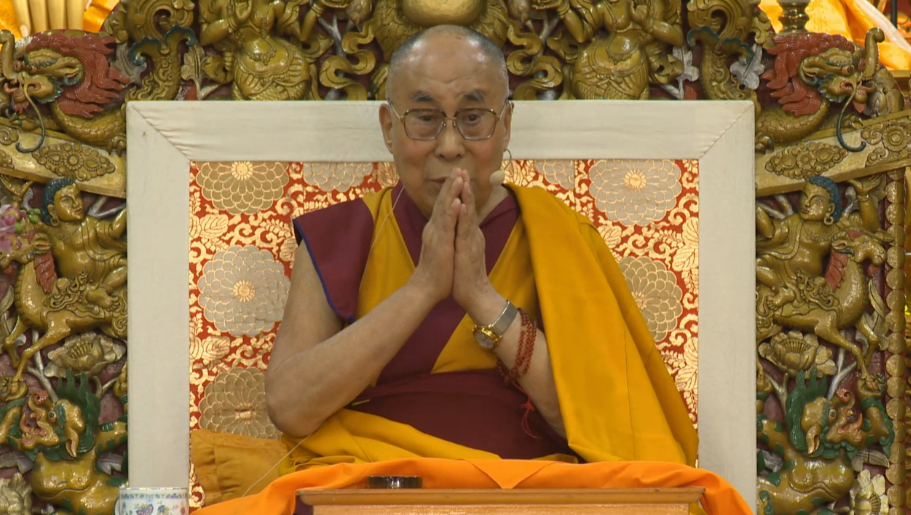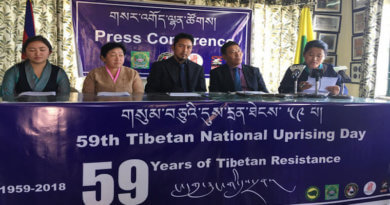58th UN Human Rights Council: China Preemptively Dismisses Human Rights Violations as Interference in Internal Affairs
By Tenzin Chokyi

DHARAMSALA 26 Feb: China’s Foreign Minister Wang Yi condemned human rights as a pretext for interfering in the internal affairs of other countries, an excuse often used by Beijing to hide from its gross violation of human rights in occupied Tibet and other occupied areas. Wang Yi made the remarks during the first day of the 58th session of the UN Human Rights Council on Monday, which is scheduled to continue till 4 April.
Addressing the session in a video message, he said, “We must say no to any words and deeds that use human rights as an excuse to interfere in the internal affairs of other countries in regard to national sovereignty, security and the safety of people’s lives”.
China’s sustained denial of human rights violations in its occupied areas like Tibet and east Turkestan via means of polarised distinction between its domestic and international politics and as a permanent member in the UN Security Council member has been its key mechanism in silencing the voices of the occupied within China and in the international discourse.
One of the principal concerns of Human Rights Watch at the ongoing 58th session is “Rights of the Child”, which, according to their official website, will cater to violence against children, education as a fundamental facilitator to the realisation of civil and political rights of a child later in life, and HIV/AIDS as one of important threat to rights of Children in today’s world.
The concerns noted in a memorandum to the member and observer states of CHR have specifically addressed the commission’s “ failure to hold China accountable for serious, widespread violations of internationally recognised human rights” as “a major setback for the body’s credibility” and urged the UN Human Rights Council “to condemn the serious and systematic violations of human rights in China”.
While it fails to address the urgent issue of the forced assimilation of over 1 million Tibetan children in China’s colonial boarding school, a coalition of NGOs advocating for Tibet, led by Tibet advocacy coalition has submitted a joint letter along with a petition signed by more than 350,000 people to UN High Commissioner Vulture Turk on 14 February.
The petition calls on the Commissioner to break his silence on the situation of Tibetan children in China’s colonial boarding schools in occupied Tibet, which are designed to assimilate an entire generation of Tibetans into the dominant Han culture.
However, the situation of human rights in occupied Tibet is not enlisted in this year’s annual report of the UN High Commissioner for Human Rights and the Office of the High Commissioner and the Secretary-General, according to the information provided on the official website of the UNHRC.
These reports are submitted under agenda item 2 which remains an open-ended item throughout the session, allowing for ongoing and potentially new issues to be addressed.
Madie Mckeown, the Executive Director of International Tibet Network(ITN), part of a previously mentioned coalition of NGOs, told Tibet Express that the High Commissioner’s statement won’t be made until Monday, 3 March and added, “There is still an opportunity for Tibet to be raised as we’ve been pushing”.
When asked about potential ways to mobilise support to bring Tibet into the ongoing UNHRC, she said the ITN has initiated and recommended actions for Tibet groups that include sharing and promoting the joint letter and a photo action to build traction and online awareness of the call on the High Commissioner before his delivery on 3 March.
As it becomes crucial to garner international attention to the grim state of the human rights situation, especially China’s colonial project to transform an entire generation of Tibetan Children into Chinese, the Tibetan community in Switzerland and Liechtenstein(TCSL) on the opening day of the 58th session of the UNHRC, staged a protest in front of the United Nations headquarters to condemn the deteriorating human rights situation in occupied Tibet under Chinese rule.





